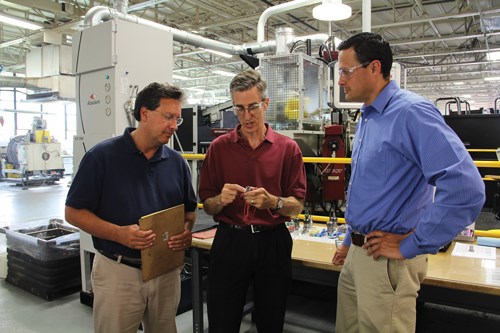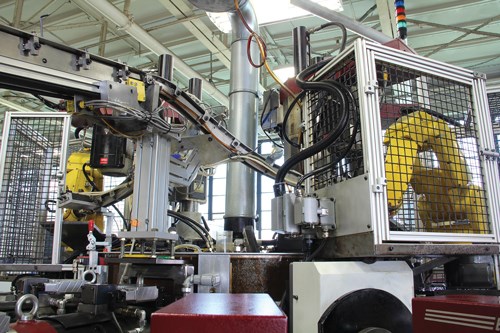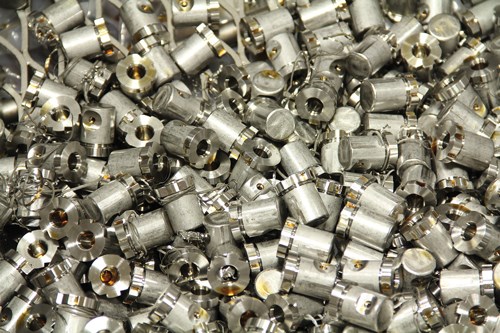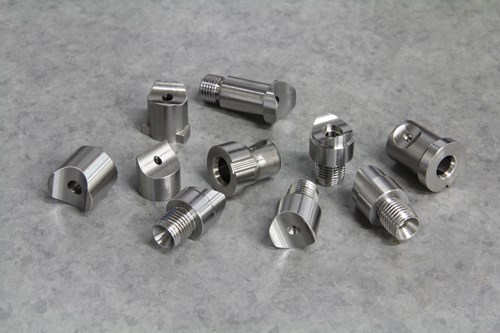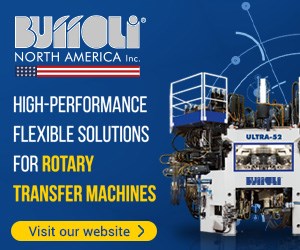Changing your Comfort Zone
Through the years, leaders of many companies needed the courage to make the technological leap from machining precision parts on single-spindles to investing in their first rotary transfer machine.
Moving from known technology to something new is, to varying degrees, always a bit of a challenge. What if you were the leader of a company that doesn’t even do machining. Would jumping straight into the world of high volume rotary transfer production scare you to death? This is a story of the men and a company who did just that, and not only lived to tell the tale, but prospered.
Starting in Detroit’s Heyday
Hi-Vol’s main plant is situated in Lavonia, Mich., a city only a couple of blocks west of Detroit’s border. The company was launched in 1951 by Herb V. Peterson who used his initials, H.V.P., when naming his new venture Hi-Vol Products. Hi-Vol’s legacy has always been concerned with automotive parts, specifically tube nuts and related fittings. In the early days, the low volume parts were cut on screw machines while the high-volume parts were produced by cold forming. In the 1980s, Hi-Vol slowly removed all the screw machines and concentrated on cold forming.
A New Leader for a New Era
Eli Crotzer is the president and CEO of Arch Global
Precision, the parent company to today’s Hi-Vol Products. The 39-year-old leader has the quiet confidence of a true professional, yet he possesses a very approachable demeanor and people are at ease in his presence, keeping an easy flow of information from the shop floor to management. Mr. Crotzer is no pushover, though; a sign that states “No Whiners” hangs on the wall behind his desk, letting people know where he stands on the work ethic subject.
Arch Global currently has two business segments; the precision machined components segment that includes Hi-Vol, and the cutting tools and instrument segment, which includes KEO Cutters, KEO Milling Cutters and Richards Micro Tool. Mr. Crotzer came into this business in 2003 without a lot of manufacturing experience; he came from the world of mergers and acquisitions in finance related areas.
His experience eventually led to the formation of Arch Global in December 2011 by buying several businesses from TriMas Corporation, with the help of a private equity sponsor, Strength Capital Partners. Arch Global made its first acquisition in 2012. “Our goal is to complete two acquisitions a year, building to $200 to $250 million in sales per year within the next 5 years,” Mr. Crotzer says.
The Great 2205 Stainless Steel Experiment
In 2007 Mr. Crotzer and his team were approached by an existing tube nut customer who saw Hi-Vol listed on the MAThread website as a license holder. “They asked, ‘Can you guys do this?’ It was a machined fitting made of 2205 duplex stainless steel with MAThread truncated lead-in threads,” Mr. Crotzer explains. “We said, ‘We haven’t done it before, but we will give it a try.’ So we started doing some prototyping.”
Hi-Vol didn’t have significant machining experience prior to this project, only a couple of custom cells that were doing drill, tap and ream for a handful of jobs; there were no lathes or mills. As they looked at the volumes that were required, they decided to approach Hydromat Inc.
The Giant Leap to Rotary Transfer
“We decided to buy a Hydromat Epic 16-station bar-loaded machine,” Mr. Crotzer says. “We didn’t want to layer in ten or 15 standard CNC machines to do the equivalent of what one Hydromat could do.”
Was he nervous? “Not as much as I should have been,” Mr. Crotzer recalls, with a laugh. “We weren’t very nervous initially. We said to ourselves, ‘Let’s just give it a try.’” Hi-Vol has a culture that encourages staff members to try different things and take reasonable risks. “We have talent. We don’t walk away from challenges. We believe we can figure out a way to do it,” Mr. Crotzer says.
The material proved harder to machine than anyone had anticipated. “Ultimately, with a lot of hard work by both organizations, we got to some cycle times that were within our target range,” Mr. Crotzer says. That first Hydromat machine has run almost around the clock since racking up more than 10 million pieces. Hi-Vol was the first to cut 2205 stainless steel on a Hydromat, a fact that Mr. Crotzer seems proud of.
Hi-Vol’s big leap from cold heading to rotary transfer machining was mostly because of that specific request from that customer, but the whole program was accelerated by government standards and consumer demands. “This opportunity was created by a technological shift in the automotive industry, going from low pressure fuel injection to high pressure direct injection,” Mr. Crotzer explains. “This technology offers better gas mileage, better torque and fewer emissions on start-up.”
There is an entire universe of automobiles with low-pressure today that will migrate to high-pressure within a 10-year period. “The numbers were very compelling. It is a great opportunity,” Mr. Crotzer says.
Bring on the Injector Cups
Based on the success of the 2205 stainless steel inlet fitting program, the customer asked if Hi-Vol could supply a 302 HQ stainless steel cold formed and machined injector cup for them. In the bar turning process, the injector cup’s tabs created quite a bit of excess material that had to be cut away. “We never had cold-headed a part with these types of tabs before, and we hadn’t cold formed stainless steel, but we were willing to give it a try,” Mr. Crotzer says.
Trials on the cold forming process proved to be difficult, but after some valiant efforts by the Hi-Vol staff, the injector cup cold heading process was perfected. Hydromat then created an advanced machining solution to meet Hi-Vol’s production needs: a double production EPIC HS 16 indexing chuck machine that incorporated two Fanuc robots.
Three Words: Service, Service, Service
Hi-Vol is loaded with high-tech cold forming machines, purchased in the U.S., “We ended up buying from National Machinery in Tiffin, Ohio,” says Paul Cary, Hi-Vol’s engineering manager since 2000. “Its service, support and training was going to be key to making that technology work in our plant.” Mr. Cary says. “Bringing rotary transfer into a plant that really wasn’t a machining plant, we recognized that the proximity of Hydromat in St. Louis for service, support and training needed to be close to be successful.
Mr. Cary gives accolades to Hydromat for service work. “That has been the key to our success with it (rotary transfer). The majority of our issues we solve with the Hydromat guys over the phone, or they can hook up online. I think in 5 years, with everything we’re doing around the clock, we only had a half a dozen service calls on site.” Randy Hinz, V.P. of operations for the past 12 years, says, “Hydromat can put someone on a plane, can be available on a call, can wire into a machine, and can be here and get us going again.”
Keeping the Oil Hot
In the ensuing years, Hi-Vol has added seven more Hydromat machines, for a total of nine in the past 6 years with the tenth slated for installation in February 2014. Today, they run 24 hours a day, 7 days a week. “We like to keep the oil hot,” Mr. Crotzer says.
After the installation of its second machine, the Hi-Vol staff took over the final setup duties themselves. “In a 5-year period, we’ve evolved from needing to have everything turn-key to doing the setup pretty much all ourselves,” Mr. Carey says. “That’s been with a lot of help, training and support from Hydromat.”
The whole Hi-Vol organization is adapting well. “The average years of experience our machine technicians have, excluding a few newer hires, is 18 -20 years—in the plant,” Mr. Crotzer says, emphasizing the last point. “A significant number of our technicians have never worked anywhere else.”
Hi-Vol only had a few technicians with a small amount of machining experience, but Mr. Cary believes this was an advantage. “The guys who were trained by Hydromat didn’t have a lot of baggage with them. Our best Hydromat guy never ran a Hydromat until he was trained there (St. Louis).” Mr. Crotzer adds, “We sent guys extensively to St. Louis, and we had Hydromat technicians come here, so in terms of training, we invested heavily on the front end.”
Randy Hinz explains his philosophy about the nature of their “man vs. machine” battle. “At the end of the day, Hydromat is a mechanical beast. It’s just like a cold header with lots of mechanical things going on—you’ve got to think about what’s really going on inside.”
He believes the step by step nature of the cold heading machine process relates closely enough to the rotary transfer method. “They didn’t know machining, but they had the concepts down,” Mr. Hinz says.
When looking back at the arrival of the first machining jobs, Mr. Hinz remembers two reasons he had no real trepidations. “Number 1, we were too dumb to know any better. Number 2, on a cold header, you break tools every day. It doubles up, it smashes, wipes out the whole thing. You gotta’ start over. Well, that’s just the job. You say ‘OK, fix it,’ and you keep running, and you don’t do it again. I think that gave us an advantage.”
Nurturing the Corporate Culture
Mr. Crotzer is particularly proud of Hi-Vol’s culture and believes they have benefitted greatly from it. Now they have experienced machinists who have come from other shops and, happy with their experience, become referral points for attracting their ex-co-workers to seek out employment at Hi-Vol.
“Feedback from those guys has been very positive and has helped us maintain a skilled workforce,” Mr. Cary says.
He adds, “We promote tremendously from within. I can’t remember the last time we went outside for a salaried position.”
Reshoring and Exporting
The spirit of the reshoring initiative is alive and well at Hi-Vol, as they are expanding their shipments to Mexico, Australia, Poland and China. “The whole notion of manufacturing machined components here and shipping them to China for assemblies is a reality for this business,” Mr. Crotzer continues. “That seems highly counter-intuitive to those of us in manufacturing that know what China can do from a pricing standpoint, but again, these parts are not easy.”
Hi-Vol has quickly become the leader in hard-to-machine high pressure direct injection component applications. The recognition by the customer base has been the validation. Initially, Hi-Vol had one customer and two programs, both from GM. Today, they have launched or have been awarded ten programs from seven different customers including Ford and Volvo. Hi-Vol is actively working with every significant participant in the market. “As our reputation has developed, we’ve seen more and more opportunities. It’s safe to say, 5 years from now, we will likely have 15 to 20 Hydromats,” Mr. Crotzer says.
Will Hi-Vol try to duplicate these successes in other industries? “We have our tube nut business that is very mature, but very dependable, and we have very, very
high growth opportunities in these direct injection fuel components,” Mr. Crotzer says. “We want to stay focused on our target application. Looking for other industries or other applications will only serve to dilute the focus and would ultimately prove counterproductive to what we
are trying to achieve.”
Due to his company’s advancements with stainless cold heading and the addition of a significant line-up of Hydromat machines now on his floor, Mr. Crotzer is feeling pretty good about his position in the marketplace. “Now, other OEMs are coming to us because they know we have done it. We were in on GM’s first two significant programs, and the other OEMs know we are now 2 to 3 years ahead of the other guys in expertise.” It’s a good spot to be in for sure.
Related Content
Taking the Complexity out of Swiss Machining
How machine shops become more efficient with offline CAM programming, featuring toolpath generation, built-in simulation, multichannel control, proven postprocessors and seamless Solidworks integration.
Read MoreAutomation Breakthroughs Revolutionize Precision Machining for Complex Parts
Marubeni Citizen-Cincom delivers custom solutions to address some of the biggest challenges in precision machining from handling small parts, to robot integration and unique tooling needs.
Read More5-Axis Machining Centers Transform Medical Swiss Shop
Traditionally a Swiss machine shop, Swiss Precision Machining Inc. discovers a five-axis machining center that has led the company to substantial growth. (Includes video.)
Read MoreCAM-Driven Lathe Questions
There can be hidden issues using legacy cam-driven lathes that can be overcome using new CNC technology. Here are three to keep in mind.
Read MoreRead Next
Finding the Right Tools for a Turning Shop
Xcelicut is a startup shop that has grown thanks to the right machines, cutting tools, grants and other resources.
Read MoreHow To (Better) Make a Micrometer
How does an inspection equipment manufacturer organize its factory floor? Join us as we explore the continuous improvement strategies and culture shifts The L.S. Starrett Co. is implementing across the over 500,000 square feet of its Athol, Massachusetts, headquarters.
Read More


